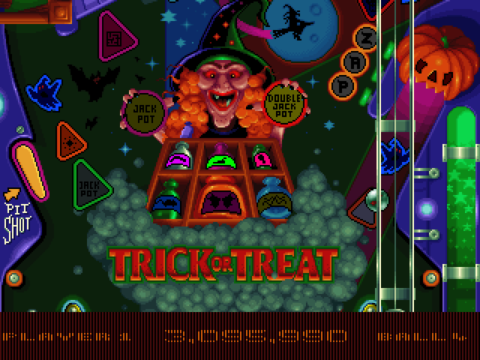
Psycho Pinball
Written by: Rik
Date posted: July 16, 2008
- Genre: Action
- Developed by: Codemasters
- Published by: Codemasters
- Year released: 1995
- Our score: 6
Although there’s certainly enough in it to attract a modestly-sized hardcore of wet-lipped enthusiasts, it’s fairly safe to say that pinball isn’t of huge interest to the wider public. As concepts for games go, recreating the undemanding experience of thwacking a ball bearing around by hammering a couple of flippers on your expensively-assembled home computer doesn’t seem like the best use of time or resources.
Personally, if real-life pinball were suddenly and unexpectedly to be outlawed by the EU, I would neither know nor care, with own experiences starting and finishing at a small café in rural France in around 1987, a brief and unsuccessful adventure which left me with the distinct impression that my francs would have been better spent in the adjacent Outrun cabinet.
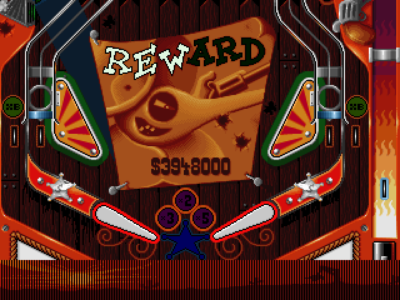
On the Wild West table, the demise of each ball prompts a slightly disturbing image of a man being hanged (bottom right).
On PC, things are slightly different matter, although it has to be said that I tend to favour the chunky visual aesthetic and crazy background music of the mid-90s over the crisp technical perfection of more accomplished simulations such as the Pro Pinball series. Which is a very long-winded way of saying I prefer pinball games that don’t remind me of real pinball. The only one deemed FFG-worthy to date has been Pinball Illusions, a gem of a game which in hindsight was deserving of slightly more generous praise than I gave it at the time.
Before that came on the scene though, I’d actually spent a good few hours with this offering from Codemasters. Exactly why it’s called Psycho Pinball, I couldn’t tell you – aside from a short clip of a maniacal clown laughing prior to the menu screen, there doesn’t seem to be any potentially disturbing content, although in fairness it’s pretty hard to come up with a title that features the word ‘pinball’ that a) makes the game sound exciting, b) makes some kind of sense, and c) hasn’t been used already by one of the several million other pinball games out there. Predictably, though, the game itself contains precious little deviation away from the standard formula of a handful of themed tables accompanied by wacky (but decent) music and suitable spot effects.
While a detailed evaluation of the mechanics of the tables themselves is largely beyond me, given the nature of the game there seems little alternative but to describe each of them in turn. We’ll start with ‘Wild West’, because it’s in the centre of the screen when you get to select your table and I’m guessing that the average lazy-minded gamer will instantly gravitate to it for this reason alone (if on the other hand you’re the sort who would spend time carefully evaluating the small logos representing each table or – even worse – reading about them in the manual, you have my apologies).
Anyway, the table is a fairly decent one, with the name itself giving you a heavy hint of what to expect: country music, ‘yee-haws’ and gun-slinging/gambling/horseshoe based bonuses and mini-games. From the selection available, it’s not a bad one to start with, but it can be pretty tough to rack up any meaningful scores without really knowing what you’re supposed to do. Fortunately, it’s all pretty easy to work out, although actually doing it is another matter entirely.
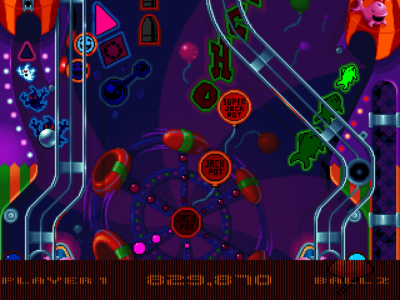
Light up the ghosts or, er, fish to get access to other tables. As you can see from this, I’m not even close with either one.
‘The Abyss’ is possibly the most forgiving of the tables, occasionally allowing idiot gamers to amass a decent score despite having no clue what’s going on, although if you don’t work it out after a little while you’ll repeatedly fall short of your original fluke and start the usual childish charade of slamming the keyboard and shouting profanities. The theme itself tends to have a calming effect, though, and is generally based on the Finding Nemo view of undersea life rather than on the James Cameron film of the same name, although if you’re a particularly angry person then a combination of successive rubbish scores and the chirpy music may cause you to have your own Michael-Biehn-goes-mad moment.
‘Trick or Treat’, on the other hand, is as hard as nails, forcing you to ensure you’ve lit the appropriate lights and activated the relevant bonuses before you can get anywhere. The music’s kind of cool, but I generally didn’t find it worth persevering with. That leaves us with ‘Psycho’, a multi-table game (and possibly the game’s unique selling point) that starts you off on a circus/madhouse-themed table and allows you to unlock and visit the other three tables during play. I think the idea is that expert players will find this most rewarding, as the potential for long-lasting games and massive high scores is great if you happen to know what you’re doing. Sadly (and predictably) though, my own attempts at this table brought little of either.
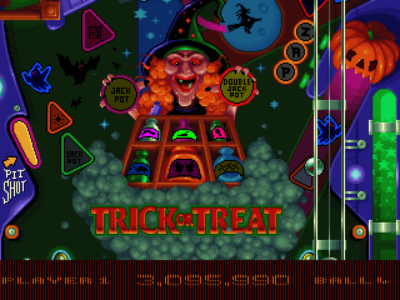
If you think ‘Trick or Treat’ is a fun table, please write in and let us know. You could win a prize.
In general, I have to say I found the game pretty unforgiving, especially when compared with Pinball Illusions. There are very few easy ways to get points, and keeping the ball in play for a little while rarely does anything for you if you don’t do the right things at the right time. To an extent that’s how it should be, and there are adjustable difficulty settings that can make things a bit easier, but for me Psycho Pinball doesn’t quite have the balance between addictive and frustrating exactly right.
Still, it can certainly suck a few hours out of an evening, and I strongly suspect that those with more of an aptitude for this kind of thing will get a bit more out of it than I did. Like most titles from Codemasters, it’s a polished title that boasts solid production values, and it’s certainly a decent pinball game. But ultimately it just lacks that certain quality that has you slapping your fingers on the keyboard for another go even though you really should do something a bit more constructive.

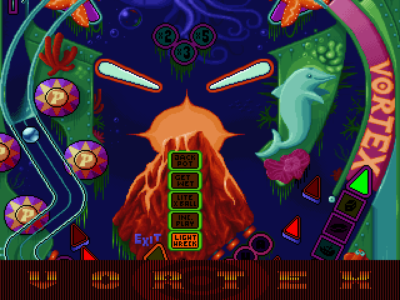

 Posts
Posts